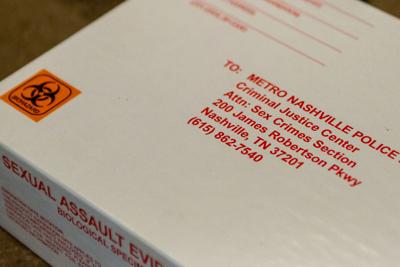Before 2018, there was only one place a victim of sexual assault could get a sexual assault forensic exam, also known as a rape kit, completed in Nashville.
Katrina Brown, lead of the Sexual Assault Nurse Examiner team at Vanderbilt University Medical Center, remembers turning patients away in those years. She had the choice of discharging the patient and directing them to Nashville General, or the police would give them a ride in the back of their car — a potentially traumatic experience in its own right.
“If we had a patient come in saying, ‘I have been sexually assaulted, I’d like a rape kit,’ we would have to look at that patient and say, ‘I’m sorry, I can’t help you here,’ ” says Brown. “It was heartbreaking. I can only imagine being a woman or having it be my daughter in that scenario, and how disheartening and frustrating that is, especially when you’ve already been victimized.”
In 2018, the Sexual Assault Center opened its SAFE — or Sexual Assault Forensic Exam — Clinic, prompted by a citywide task force led by then-Mayor Megan Barry. Today, sexual assault forensic exams are available at VUMC, Saint Thomas Midtown and Skyline Medical Center, as well as Nashville General Hospital and the Sexual Assault Center. However, nurses like Brown advise patients to expect to wait at least a year before any action will be taken on their case.
In July 2021, the state legislature passed the Jim Coley Protection for Rape Survivors Act, and one year later implemented a sexual assault kit tracking website. A bill introduced in December would require that the Tennessee Bureau of Investigation test the evidence within 30 days. The state’s labs are understaffed, and it’s unclear whether the state has hired the 25 new lab positions announced last fall. (Read more on that here.)
“They are sitting on a shelf until someone has time to pick it up and process it, which is unfortunate,” says Kelly Peters, director of advocacy and director of the SAFE Clinic at the Sexual Assault Center. “I think that’s a societal thing in how we don’t prioritize victims and crimes against women.”
Nurses who administer rape kits, like Julie Davis and her team of 10 nurse practitioners, hold themselves to a “trauma-informed” standard. These nurses are contracted through Nashville General Hospital to respond to calls at area hospitals and the Sexual Assault Center. (VUMC has its own team.) Timing is important, as victims must complete the sexual assault forensic exam within 120 hours of the assault. Davis says when she gets an inquiry from out of the county, she sends them to the Sexual Assault Center.
“We try to send as many people as we can to the Sexual Assault Center, just because of the atmosphere,” Davis says. “It’s not like the emergency department. It’s more personable.”
Brown says it is considered best practice for nurses to complete Sexual Assault Nurse Examiner training before administering rape kits. A rape kit can be administered by a bedside nurse or physician in a pinch, though calling in a SANE nurse team is considered ideal because they’re on call specifically for this task. Additionally, at hospitals, patients there to receive a sexual assault forensic exam are considered “high priority” for being taken to an exam room, Brown says. Also as part of trauma-informed care, an advocate from the Sexual Assault Center accompanies the SANE nurse and follows up with the victim if they wish.
“One of the best and most wonderful and unique things about our role is that we have the ability to sit down with a patient and talk to them, because our only priority is that particular patient in that moment of time,” Brown says. “We’re not being pulled out of the room to go see another patient immediately.”
Since it opened, the Sexual Assault Center’s SAFE Clinic has seen a growing number of victims come forward and complete rape kits. Access has improved, though for now, victims will still wait years for the criminal justice system to catch up.
“I think the availability and the sole focus and it not being at a hospital allowed more people to come forward than they probably would have in the years prior,” Peters says. “Just having a place where they know that that’s the only thing that we do, and that it’s going to be probably a faster experience than going to the hospital, and they can be as comfortable here as possible — that they come forward more, which is what the intention was.”
The bureau aims to fill 25 positions and play catch-up on sexual assault kits that still await testing






